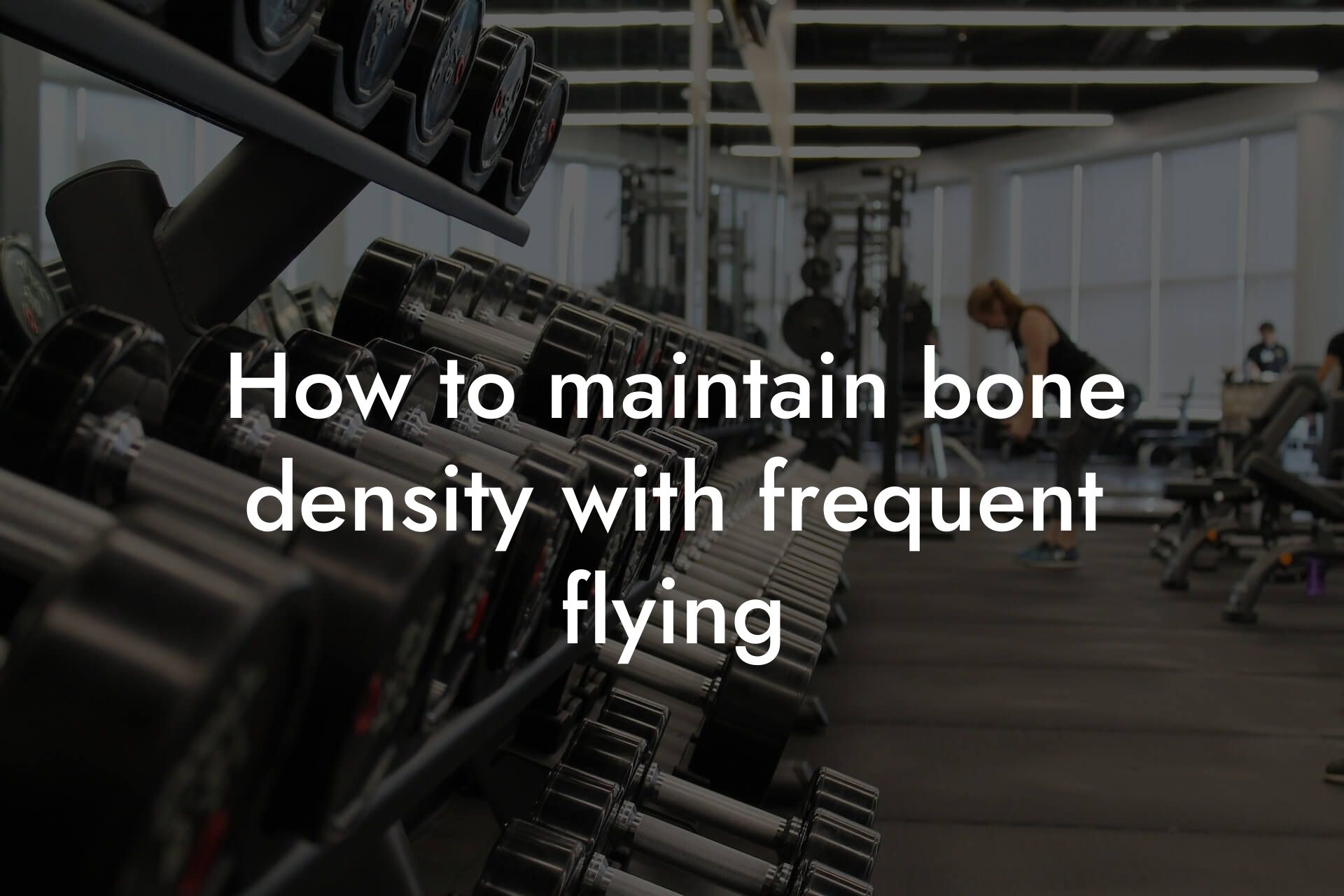The Demanding Nature of Aviation Professionals
Aviation professionals, including pilots, flight attendants, and air traffic controllers, face a unique set of challenges that can impact their physical and mental well-being. The demands of their job, including irregular schedules, time zone changes, and high-pressure decision-making, can lead to chronic stress, fatigue, and decreased physical fitness. It's essential for these individuals to prioritize their health and wellness to maintain their performance and ensure the safety of passengers and crew.
Table of Contents
- The Demanding Nature of Aviation Professionals
- The Impact of Stress on Aviation Professionals
- The Importance of Physical Fitness in Aviation
- Challenges to Staying Fit in the Aviation Industry
- Strategies for Managing Stress and Staying Fit
- The Role of Body Composition in Aviation Fitness
- How DEXA Scans Can Help Aviation Professionals
- Frequently Asked Questions
The Impact of Stress on Aviation Professionals
Chronic stress can have severe consequences on the physical and mental health of aviation professionals. It can lead to anxiety, depression, and sleep disorders, which can impair cognitive function, judgment, and reaction time. Additionally, stress can weaken the immune system, making individuals more susceptible to illnesses and infections. In the aviation industry, where split-second decisions can be a matter of life and death, the impact of stress on performance can be catastrophic.
The Importance of Physical Fitness in Aviation
Physical fitness is critical for aviation professionals, as it directly affects their ability to perform their duties safely and efficiently. Regular exercise can improve cardiovascular health, increase strength and flexibility, and enhance overall physical resilience. Moreover, physical fitness can help mitigate the effects of stress, improve mood, and increase energy levels. In the aviation industry, where physical demands can be high, maintaining a good level of physical fitness is essential.
Challenges to Staying Fit in the Aviation Industry
Aviation professionals face unique challenges when it comes to staying fit. Irregular schedules, long periods of sitting, and limited access to healthy food options can make it difficult to maintain a regular exercise routine and healthy diet. Additionally, the physical demands of the job, such as lifting heavy bags or working in cramped spaces, can increase the risk of injury. Furthermore, the constant travel and time zone changes can disrupt sleep patterns, making it challenging to recover from physical activity.
Strategies for Managing Stress and Staying Fit
Despite the challenges, there are several strategies that aviation professionals can use to manage stress and stay fit:
-
Develop a regular exercise routine, such as yoga or bodyweight exercises, that can be done in a hotel room or at home.
-
Focus on functional training, such as squats and lunges, to improve strength and mobility.
-
Incorporate stress-reducing activities, such as meditation or deep breathing exercises, into daily routine.
-
Prioritize sleep and aim for 7-8 hours of restful sleep each night.
-
Stay hydrated by drinking plenty of water throughout the day.
-
Pack healthy snacks, such as nuts and fruits, to avoid relying on fast food or unhealthy airport options.
-
Take advantage of airport gyms or fitness centers to stay active during layovers.
-
Consider working with a personal trainer or fitness coach to develop a customized fitness plan.
The Role of Body Composition in Aviation Fitness
Body composition plays a critical role in aviation fitness, as excess body fat can increase the risk of chronic diseases, such as diabetes and heart disease. Moreover, excess body fat can impair physical performance, making it more challenging to perform duties safely and efficiently. Aviation professionals should aim to maintain a healthy body fat percentage, typically between 10-20% for men and 15-25% for women.
How DEXA Scans Can Help Aviation Professionals
DEXA (Dual-Energy X-ray Absorptiometry) scans are a valuable tool for aviation professionals looking to optimize their body composition and overall fitness. DEXA scans provide a detailed analysis of body fat percentage, lean muscle mass, and bone density, allowing individuals to identify areas for improvement and track progress over time. By using DEXA scans, aviation professionals can:
-
Monitor body fat percentage and make adjustments to diet and exercise routine as needed.
-
Track changes in lean muscle mass and bone density to optimize physical performance.
-
Identify potential health risks, such as osteoporosis or sarcopenia, and take proactive steps to mitigate them.
Managing stress and staying fit is crucial for aviation professionals, who face unique challenges that can impact their physical and mental well-being. By prioritizing exercise, healthy eating, and stress-reducing activities, aviation professionals can maintain their performance and ensure the safety of passengers and crew. Additionally, DEXA scans can provide valuable insights into body composition and overall fitness, helping individuals optimize their health and wellness. By taking a proactive approach to their health, aviation professionals can thrive in their demanding profession.
Frequently Asked Questions
What are the common sources of stress in the aviation industry?
Aviation professionals often face unique stressors such as irregular schedules, long hours, and high-pressure decision-making. Additionally, factors like turbulence, emergency situations, and the weight of responsibility for passenger safety can contribute to stress. Furthermore, the constant need to adapt to changing weather conditions, air traffic control regulations, and aircraft maintenance issues can also take a toll on mental and physical well-being.
How does stress affect pilots and aviation professionals?
Chronic stress can lead to fatigue, decreased concentration, and impaired judgment, which can compromise safety in the aviation industry. It can also contribute to anxiety, depression, and other mental health issues. Physically, stress can manifest as headaches, muscle tension, and gastrointestinal problems. If left unmanaged, stress can negatively impact overall health, relationships, and job performance.
What are some common fitness challenges faced by aviation professionals?
Aviation professionals often face unique fitness challenges due to their irregular schedules, limited access to healthy food options, and prolonged periods of sitting. They may also experience fatigue, jet lag, and disrupted sleep patterns, making it difficult to maintain a regular exercise routine. Furthermore, the confined spaces and limited mobility during flights can contribute to stiffness, poor posture, and decreased physical activity.
How can aviation professionals prioritize their physical health?
Aviation professionals can prioritize their physical health by incorporating simple exercises into their daily routine, such as stretching, yoga, or bodyweight exercises. They can also focus on healthy eating habits, including meal prep, packing nutritious snacks, and staying hydrated. Regular sleep schedules, stress management techniques, and prioritizing self-care can also contribute to overall physical well-being.
What role does nutrition play in managing stress and staying fit in the aviation industry?
Nutrition plays a crucial role in managing stress and staying fit in the aviation industry. A balanced diet rich in whole foods, fruits, vegetables, and lean proteins can help support mental health, energy levels, and overall physical well-being. Avoiding processed and high-sugar foods, staying hydrated, and limiting caffeine and alcohol consumption can also help mitigate the negative effects of stress and promote healthy weight management.
How can aviation professionals stay hydrated during flights?
Aviation professionals can stay hydrated during flights by drinking plenty of water, avoiding caffeine and alcohol, and consuming hydrating foods like fruits and vegetables. They can also consider bringing a refillable water bottle on board and taking regular breaks to stretch and move around the cabin.
What are some stress-reducing techniques for aviation professionals?
Aviation professionals can benefit from stress-reducing techniques like deep breathing exercises, meditation, and yoga. They can also practice mindfulness, journaling, and gratitude exercises to help manage stress and anxiety. Additionally, engaging in hobbies, spending time with loved ones, and prioritizing self-care can help reduce stress and promote overall well-being.
How can aviation professionals balance work and personal life?
Aviation professionals can balance work and personal life by setting clear boundaries, prioritizing self-care, and communicating effectively with family and friends. They can also consider delegating tasks, setting realistic goals, and taking regular breaks to recharge and reduce burnout.
What are some common misconceptions about stress and fitness in the aviation industry?
One common misconception is that stress is an inherent part of the job and cannot be managed. Another misconception is that fitness requires a lot of time and equipment, making it difficult for aviation professionals to prioritize their physical health. However, with simple exercises, healthy eating habits, and stress management techniques, aviation professionals can prioritize their well-being and improve their overall health.
How can aviation professionals get support for managing stress and staying fit?
Aviation professionals can get support for managing stress and staying fit by talking to their healthcare provider, seeking counseling or therapy, or joining a support group. They can also consider working with a fitness professional or nutritionist to develop a personalized wellness plan. Additionally, many airlines and aviation organizations offer employee wellness programs and resources to support their staff.
What are some tips for staying fit during layovers?
Aviation professionals can stay fit during layovers by packing a workout bag with essentials like resistance bands, yoga mats, or running shoes. They can also explore local fitness options, such as gyms or studios, or take advantage of hotel fitness facilities. Additionally, they can prioritize healthy eating habits, stay hydrated, and get enough sleep to help maintain their physical health.
How can aviation professionals prioritize sleep during irregular schedules?
Aviation professionals can prioritize sleep during irregular schedules by establishing a consistent sleep routine, avoiding caffeine and electronics before bedtime, and creating a sleep-conducive environment. They can also consider using earplugs, eye masks, or melatonin supplements to help regulate their sleep patterns.
What are some common mistakes aviation professionals make when it comes to fitness and stress management?
Common mistakes include neglecting self-care, prioritizing work over personal well-being, and ignoring the signs of burnout. Aviation professionals may also underestimate the importance of nutrition, hydration, and sleep in managing stress and staying fit.
How can aviation professionals make fitness and stress management a priority?
Aviation professionals can make fitness and stress management a priority by setting realistic goals, creating a schedule, and holding themselves accountable. They can also consider finding a workout buddy or accountability partner, tracking their progress, and celebrating small victories along the way.
What are some resources available to aviation professionals for managing stress and staying fit?
Aviation professionals can access resources such as the Federal Aviation Administration's (FAA) Guide to Pilot Health, the International Air Transport Association's (IATA) Wellness Program, and the Air Line Pilots Association's (ALPA) Health and Wellness Resources. They can also consider working with a fitness professional or nutritionist, or joining a support group specifically designed for aviation professionals.
How can aviation professionals measure their progress in managing stress and staying fit?
Aviation professionals can measure their progress by tracking their sleep patterns, exercise routine, and nutrition habits. They can also monitor their stress levels, mood, and overall sense of well-being. Regular health check-ups, fitness assessments, and progress photos can also help them track their progress and stay motivated.
What are some common myths about fitness and stress management in the aviation industry?
Common myths include the idea that fitness requires a lot of time and equipment, that stress is an inherent part of the job, and that aviation professionals are too busy to prioritize their well-being. However, with simple exercises, healthy eating habits, and stress management techniques, aviation professionals can prioritize their physical and mental health.
How can aviation professionals stay motivated to prioritize their fitness and stress management?
Aviation professionals can stay motivated by setting realistic goals, celebrating small victories, and finding a workout buddy or accountability partner. They can also consider rewarding themselves for reaching milestones, tracking their progress, and reminding themselves of the benefits of prioritizing their well-being.
What are some tips for managing stress and staying fit during the holiday season?
Aviation professionals can manage stress and stay fit during the holiday season by prioritizing self-care, setting realistic goals, and maintaining a consistent routine. They can also consider packing healthy snacks, staying hydrated, and finding ways to stay active, such as taking a walk or doing a quick workout during layovers.
How can aviation professionals prioritize their mental health?
Aviation professionals can prioritize their mental health by practicing mindfulness, seeking support from loved ones or a mental health professional, and engaging in activities that bring them joy and relaxation. They can also consider journaling, meditation, or yoga to help manage stress and anxiety.
What are some benefits of prioritizing fitness and stress management in the aviation industry?
Prioritizing fitness and stress management can improve overall health, increase energy levels, and enhance job performance. It can also reduce the risk of chronic diseases, improve sleep quality, and increase feelings of happiness and well-being. Additionally, prioritizing fitness and stress management can improve relationships, increase productivity, and enhance overall quality of life.
How can Tano Performance Group support aviation professionals in managing stress and staying fit?
Tano Performance Group offers a range of resources, including personalized fitness and nutrition plans, stress management techniques, and wellness coaching specifically designed for high-earning professionals in the aviation industry. Our team of experts can help aviation professionals prioritize their physical and mental health, improve their overall well-being, and achieve their fitness goals.
Here are some related articles you might love...
- How to maintain bone density with frequent flying
- The benefits of DEXA scans for aviation professionals
- How aviation professionals can manage jet lag and fitness
- Staying fit while managing irregular flight schedules
- Balancing in-flight duties with personal fitness goals
- Nutrition strategies for staying healthy on long flights
- The impact of physical health on flight safety
- The role of physical fitness in maintaining flight readiness
- Quick workouts for pilots and flight attendants during layovers
Zak Faulkner
Zak Faulkner is a leading authority in the realm of physical health and body composition analysis, with over 15 years of experience helping professionals optimise their fitness and well-being. As one the experts behind Tano Performance Group, Zak has dedicated his career to providing in-depth, science-backed insights that empower clients to elevate their physical performance and overall health.
With extensive knowledge of DEXA technology, Zak specializes in delivering comprehensive body assessments that offer precise data on body fat, muscle mass, bone density, and overall physique. His expertise enables individuals to make informed decisions and achieve their fitness goals with accuracy and confidence. Zak’s approach is rooted in a deep understanding of human physiology, combined with a passion for helping clients unlock their full potential through personalised strategies.
Over the years, Zak has earned a reputation for his commitment to excellence, precision, and client-focused service. His guidance is trusted by top professionals who demand the best when it comes to their health. Whether advising on fitness programs, nutritional strategies, or long-term wellness plans, Zak Faulkner’s insights are a valuable resource for anyone serious about taking their health and fitness to the next level.
At Tano Performance Group, Zak continues to lead our Content Team revolutionising how professionals approach their physical health, offering unparalleled expertise that drives real results.




